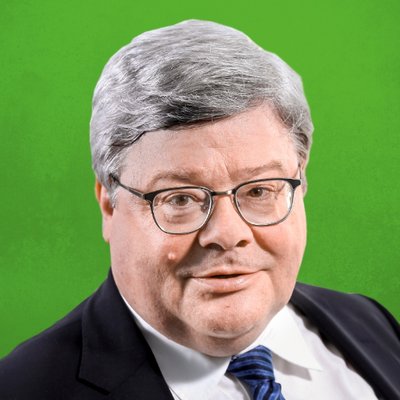‘Seen from Berlin, Asia seemed to consist only of China. But that’s long over. There is now an across the spectrum consensus in Germany for developing stronger ties with India,’ says Reinhard Bütikofer, Member of European Parliament.
Germany’s relations with India are set for an upswing during Prime Minister Narendra Modi’s visit to Berlin on 2 May, says Reinhard Bütikofer, Member of European Parliament (MEP). In this wide-ranging interview, Bütikofer, an influential MEP from Germany, speaks about the growing robust bipartisan consensus in Germany on building stronger relations with India, the world’s largest democracy, and how India and Germany can partner in third countries under the EU’s 3 billion euro Global Gateway programme for building infrastructure in Asia and Africa. Looking ahead, Bütikofer projects that the relations of Europe and Germany with China are headed for difficult times even as relations with India will grow stronger in days to come. Bütikofer was among the five MEPs sanctioned by China last year for opposing the ratification of the EU-China Comprehensive Agreement on Investment (CAI). Bütikofer, one of the Co-Chairs of the European Green Party and MEP for the German Green party, was in India recently to participate in the Raisina Dialogue, the flagship conference of India’s Ministry of External Affairs, co-hosted by the Observer Research Foundation. Excerpts from the interview.
Q: Prime Minister Narendra Modi will be in Berlin on 2 May for his first meeting with German Chancellor Olaf Scholz. What do you expect from this visit?
A: First of all, it’s important to note that the German Chancellor is meeting the Japanese Prime Minister Fumio Kishida and the Indian Prime Minister first. Those are the first two interlocutors from Asia for him. The choice of the first two interlocutors suggest that Germany’s new leader wants to focus on building stronger relationship with likeminded countries and partners that share our values.
Secondly, Germany has been one of the leaders in the EU in developing the Indo-Pacific perspective. Germany was the second country after France to come forward with an Indo-Pacific strategy. Now, we have the European and the Pacific strategy. Clearly, Germany has to play an important role in rolling that out.
Third, European Commission President Ursula Von der Leyen, together with Prime Minister Modi, recently announced the EU-India Trade and Technology Council, which is a great novel idea. I think it is important to register German buy in for that because as the major industrial nation, as a nation that plays a very strong role with regard, for instance, to standardization, Germany has to be a strong participant in that effort. The decision to set up a Trade and Technology Council will be the first for India with any of its partners and second for the European Union following the first one it has set up with the US.
Fourthly, the new German government has clearly signalled that it wants to enhance the India relationship and that can play out in many different dimensions. There are various possibilities, including enhanced collaboration in research and more trade and investment. There is, therefore, a broad agenda for intensifying India-Germany partnership which will be in focus during PM Modi’s visit to Germany.
Q: Looking forward, what are the two or three areas where we should be focusing our relationship on, and which will be in display during this visit?
A: I’m very much in favour of fostering Germany-India relations but I would always place that in the European context. In the European context, I think it would be very important for Germany and India to cooperate on digital connectivity. It would be very important for Germany and India to cooperate in the context of Von der Leyen’s Global Gateway initiative. For instance, India and European partners should be working together with third partners in East Africa, or in Asia. This partnership in third countries holds great promise as Germany has been one of the premier supporters of the Global Gateway initiative.
Q: How do you look at Germany’s relationship with China, especially in the context of China moving closer to Russia in the aftermath of the Russian attack on Ukraine? Will there be a rethink on the relationship of Germany and Europe vis-à-vis China?
A: The rethink has been going on for years. And at the moment, we are at a very low ebb in the China-Germany relationship. The trust has dissipated. China is clearly in the same camp as Russia. They have struck a revisionist accord that is based on mutual interest and shared antagonism against the values that we hold high. So I foresee a difficult future for the European-Chinese relations more broadly, and certainly for the German-Chinese relations.
Q: Will this growing distrust of China translate into a more robust partnership with India, the world’s largest democracy?
A: To understand that, we must avoid being unilaterally dependent on China is one thing. But then to forge the necessary agreements with India to enhance our economic engagement is a second task. But clearly, there is an enhanced interest in Germany in fostering stronger relationship with India. I would say a bit critically, that for a while, from Berlin, seen from Berlin, Asia seemed to consist only of China. But that’s long over. There is now an across the spectrum consensus in Germany for developing stronger ties with India. The two junior coalition partners, the Greens and the Liberals, have pushed for that very strongly. The December 2021 coalition document has named India as one of major foreign policy priorities of Germany’s new government. The coalition treaty document underlines enhanced India-Germany cooperation for peace and stability in the Indo-Pacific and highlights the importance of strengthening the Indo-German strategic partnership.
Manish Chand is Founder-CEO, India Writes Network, India and The World, and Centre for Global India Insights, a think-tank focused on global affairs.

